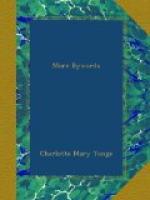“Poor puss, in vain thy loving wail,”
Then came a joyful start!
A little hand was on his cloak—
“Father!” a voice beside him spoke,
Emerging from the wood.
All travel-stained, and marked with mire,
With trace of blood, and toil, and fire,
Yet safe and sound beside his sire,
Edric before them stood.
And as his father wept for joy,
King Alfred blessed the rescued boy,
And thanked his Maker good!
Who doth the captive’s prayer fulfil,
Making His creatures work His will
By means not understood.
Note.—The remains of the five Danish vessels still lie embedded in the mud of the Hamble River near Southampton, though parts have been carried off and used as wood for furniture in the farm-houses. The neighbouring wood is known as Cat Copse, and a tradition has been handed down that a cat, and a boy in a red cap, escaped from the Danish ships, took refuge there.
DE FACTO AND DE JURE
I. DE FACTO
The later summer sunbeams lay on an expanse of slightly broken ground where purple and crimson heather were relieved by the golden blossoms of the dwarf gorse, interspersed with white stars of stitch-wort. Here and there, on the slopes, grew stunted oaks and hollies, whose polished leaves gleamed white with the reflection of the light; but there was not a trace of human habitation save a track, as if trodden by horses’ feet, clear of the furze and heath, and bordered by soft bent grass, beginning to grow brown.
Near this track—for path it could hardly be called—stood a slender lad waiting and watching, a little round cap covering his short-cut brown hair, a crimson tunic reaching to his knee, leggings and shoes of deerhide, and a sword at his side, fastened by a belt of the like skin, guarded and clasped with silver. His features were delicate, though sunburnt, and his eyes were riveted on the distance, where the path had disappeared amid the luxuriant spires of ling.
A hunting-horn sounded, and the youth drew himself together into an attitude of eager attention; the baying of hounds and trampling of horses’ hoofs came nearer and nearer, and by and by there came in view the ends of boar-spears, the tall points of bows, a cluster of heads of men and horses—strong, sturdy, shaggy, sure-footed creatures, almost ponies, but the only steeds fit to pursue the chase on this rough and encumbered ground.
Foremost rode, with ivory and gold hunting-horn slung in a rich Spanish baldrick, and a slender gilt circlet round his green hunting-cap, a stout figure, with a face tanned to a fiery colour, keen eyes of a dark auburn tint, and a shock of hair of the same deep red.
At sight of him, the lad flung himself on his knees on the path, with the cry, “Haro! Haro! Justice, Sir King!”
“Out of my way, English hound!” cried the King. “This is no time for thy Haro.”




